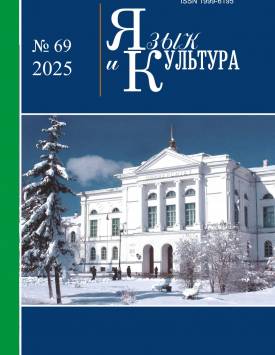Linguistic and ethical aspects of political correctness
The aim of the paper is to examine the relationship between the linguistic aspect of political correctness, politeness, and the ethical component of Western public discourse. The research material comprises 156 journalistic articles published in English- and Russian-language media in 2023-2024, 28 speeches delivered by prominent American and British politicians, scholars, and cultural figures during the same period, as well as online dictionaries, ethical codes and guidelines of universities and companies, web blogs, and user statements on social media, TV shows, and videos related to the issue of political correctness. The research methods include definitional and contextual analyses, semiotic method, and critical discourse analysis. Special attention in the study was paid to precedents and intertextuality, which play a key role in shaping cultural meanings. The article demonstrates that political correctness can be interpreted as: 1) a set of ethical norms; 2) a form of politeness; 3) a system of political views; and 4) a means of restricting freedom of speech. Challenges in studying political correctness include the ambiguity of ethical norms, leading to situations where the protection of one social community often infringes upon the interests of others; the "right to be offended" claimed by minority groups, while the rights of majority groups are ignored; the heterogeneity of minority groups; and the individual preferences of communication participants. Proponents of political correctness argue that its ethical principles emphasize respect for individuals, inclusivity ensuring that all population groups are equally involved in various types of social activities; and minimization of harm caused by discriminatory language and behavior toward historically oppressed social groups. Opponents, on the other hand, assert that political correctness is a form of censorship suppressing free speech, leading to the polarization of views and ethical disagreements. Political correctness also shapes a system of political views, with trends historically shifting toward either conservative or liberal ideologies. Currently, it marks a dividing line between Democrats and Republicans in the United States, and between Labour and Conservatives in the United Kingdom. The positive aspect of political correctness as a form of politeness lies in avoiding linguistic expressions and non-verbal gestures that offend communicators based on various aspects of their identity. However, its excessive implementation in public discourse is fraught with abuse through authoritarian imposition of verbal forms, attempts to revise established classifications, and the introduction of "linguistic hygiene" in society. Stereotypical language becomes a means of shaping a worldview not through understanding the essence of phenomena but by assigning evaluative labels (‘good’- ‘bad’) as a result of indoctrination. The linguistic aspect of political correctness influences communicative practices across all spheres of Western life: it defines educational policies, affects the film industry, sports, literature, painting, advertising, consumer goods sales, and shapes international relations. It conflicts with critical discourse and the pursuit of scientific truth. The study concludes that the relationship between language and reality is shifting under the influence of political correctness: advocates insist on regulating words to prevent incorrect behaviour. The new terminology reflects a constructivist idea-to reshape traditional values, create a “new society”, and thus create an alternative worldview. Moreover, words and expressions not directly related to political correctness are acquiring new meanings, gaining additional semantic connections and connotations. At the international level, norms of political correctness are largely dictated by English-speaking countries, particularly the United States, highlighting the need to develop intercultural norms of political correctness that consider both universal values and the national specifics of different languages and cultures. The author declares no conflicts of interests.
Keywords
ethics, politeness, political correctness, social constructivism, freedom of speech, political discourseAuthors
| Name | Organization | |
| Leontovich Olga A. | Volgograd State Socio-Pedagogical University; Pushkin State Russian Language Institute | olgaleo@list.ru |
References

Linguistic and ethical aspects of political correctness | Yazyk i Kultura – Language and Culture. 2025. № 69. DOI: 10.17223/19996195/69/3
